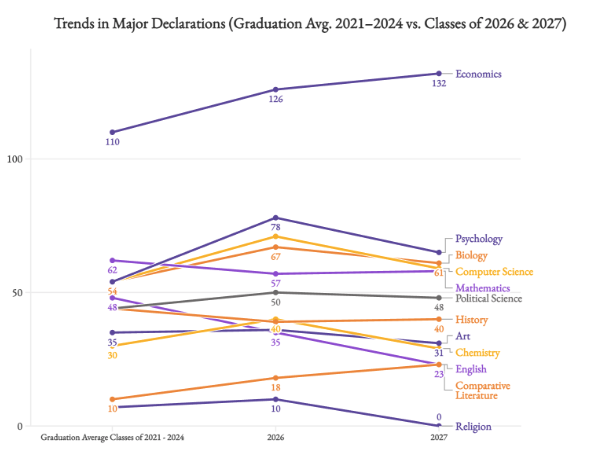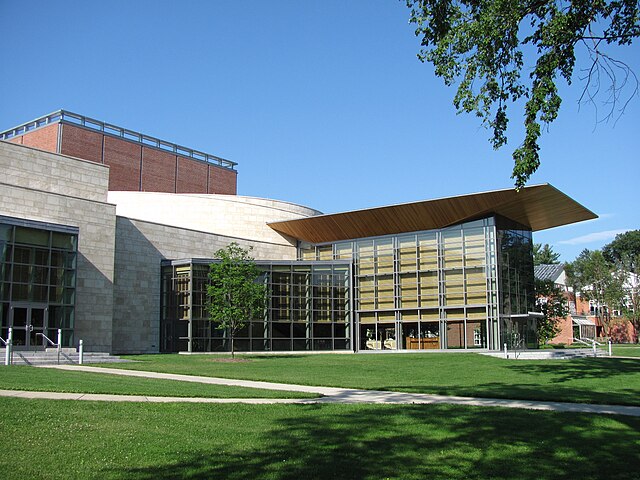Haben Girma, the first Deafblind person to graduate from Harvard Law School, spoke to the College at the ’62 Center for Theater and Dance on Monday. During the event, which was sponsored by the office of accessible education, among other campus organizations, Girma spoke on her personal journey and her lifetime of advocacy for people with disabilities.
Girma is far from the only person in her family to have struggled with adversity. Her mother was a refugee from Eritrea, a small East African nation, who walked for three weeks to Sudan and stayed there for ten months before being able to claim refugee status and emigrate to the United States. She emphasized the parallels between her mother’s story and her own, as both women have drawn strength from their deep challenges. “I define disability as an opportunity for innovation,” she said. “We can help shift the story from one of pity and shame to one of strength.”
Girma has consistently attempted to live up to this ideal, conducting activities that many around her assumed could not be performed by a deaf and blind person. “When I was growing up, I was taken out of physical education courses, because instructors assumed I wouldn’t be able to participate,” she said. However, Girma continually insisted on doing the same activities as non-disabled people, learning how to dance Salsa by feeling the beat of the music through her partner’s hands. This exchange of tactile information, she said, can be key to learning for both disabled and non-disabled people. “Skin is one of our largest organs. There is so much ability to communicate with the world through touch,” she said.
In the same vein, Girma learned how to surf, both in tandem with a professional and, later, by herself. At first, she said, surfing groups were hesitant to accept her because they doubted her abilities. “Finally, I found a place that said, ‘We’ve never heard of a deafblind surfer, but let’s try,’” she said. Girma expressed a desire to see such open-mindedness across activities and disciplines. “When we’re thoughtful and creative, any aspect of a program can be made accessible,” she added.
When entering into higher education, Girma was often forced to advocate for equal accommodation. As an undergraduate, she attended Lewis & Clark College, where the dining hall initially did not provide any way for blind students to access the menu, even after she asked the dining hall’s manager for some form of accommodation. “The manager said that they were pretty busy,” she said. “They said that they have over a thousand students and they don’t have extra time to do special things for students with special needs. Eating is not a special need.”
At first, Girma felt hesitant to push back against the unaccommodating systems around her. “I would hold myself back, and it was partially due to messages I was receiving from society, that people with disabilities are an inconvenience and a burden,” she said. A revelation came, however, when she realized that all people are interdependent on one another to a certain degree. “A lot of you like drinking coffee, but very few of you grow your own coffee beans,” she added. Girma also felt that the greater difficulties faced by others sometimes discourage people from action. “We tell ourselves, someone else has it worse off. Therefore, don’t complain, just be grateful,” she said. “It allows access barriers to exist for years and years.”
With these lessons in mind, Girma challenged Lewis & Clark, threatening legal action unless the dining halls would comply with the Americans with Disabilities Act. The school acquiesced, and not only was she able to gain accommodation, but the following year, another blind student was able to benefit from the improved services. “That taught me, when I advocate, that removes barriers for all the people that come after me,” she said.
In 2010, after graduating from Lewis & Clark, Girma applied for Harvard Law School. “Harvard told me they’d never had a Deafblind student before. I said I’d never been to Harvard Law School before,” she said. Though she encountered difficulties at Harvard, she found people who were enthusiastic to help her and others. For one exam in which other students had to compare two images and determine whether there was a copyright violation, she instead compared two physical objects and felt them for differences.
In her talk, Girma discussed her strategies for reaching out to those who might not see the value of inclusion, and pointed out that over 1.3 billion people today live with disabilities. “If you make materials and classes accessible, you reach more talented people who add more experiences and perspectives to the community,” she said. As examples, she suggested adding captions and transcripts to online images and videos.
She also consistently emphasizes to skeptics the importance of disability in spurring innovation, pointing out that technologies like the early typewriter and email were originally invented to accommodate people with disabilities. As Girma works to encourage inclusion, she is also willing to pursue legal action, but considers it a last resort. “Litigation is expensive and time consuming,” she said. “It’s much easier to be inclusive.”
Girma also highlighted the importance of privileged groups in working to dismantle barriers. “Most organizations in the United States are built for non-disabled, male, white communities. And anyone who is different from that has to struggle with all kinds of access issues. Some are subtle, some are more obvious,” she said. “It should be the dominant group that does the work of removing barriers.”
She added that it is often difficult for marginalized communities to pursue consistent advocacy. “It’s exhausting to do the work of both being a student and being an advocate,” she said.
Throughout the presentation, Girma spoke aloud, using techniques that she learned from speaking coaches and instructors. She is able to hear some higher frequencies, and has accordingly taught herself to speak in a higher voice. Throughout the evening, her assistant typed out information for her, which she was able to receive on a braille display that operates by touch. During a question-and-answer session, students were able to type out questions on a keyboard which she then answered verbally. In one question, an attendee asked her whether she was glad to have her disability. “Whether I’m glad I have a disability, shrug. It’s just my experience, it’s how I am,” she said.
Ultimately, Girma said she neither wants to be defined by her disability nor have it be ignored. “The old thinking was: See the person, not the disability. But the disability is part of the person,” she said. “Instead, see the full person, in all their complexity.”








